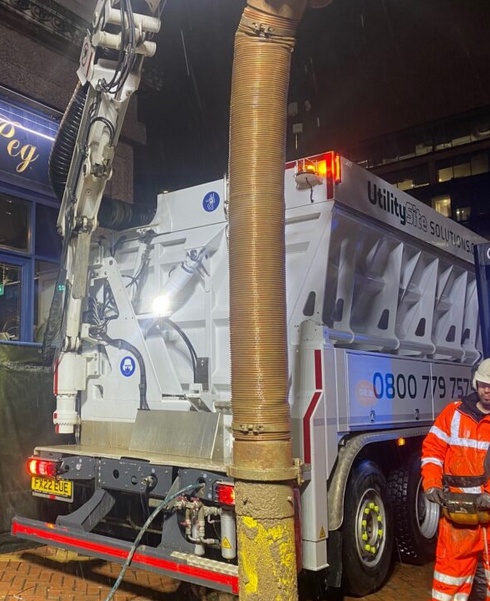Introduction
Excavation is a fundamental aspect of construction and utility maintenance, and it often involves digging and removing soil or other materials from a specific location. Traditional excavation methods, such as mechanical digging, can be time-consuming, labor-intensive, and may pose risks to underground utilities. In recent years, a revolutionary innovation has transformed the excavation industry—the Vacuum Excavation Truck. This article provides an in-depth explanation of this powerful technology.
The Vacuum Excavation Truck: A Comprehensive Overview
The Vacuum Excavation Truck, also known as a vacuum excavator or hydrovac, is a specialized vehicle designed for non-destructive digging and material removal. Its primary purpose is to excavate soil, debris, and other substances using a combination of high-pressure water and a powerful vacuum system. This innovative technology has been widely adopted in the construction, utility, and environmental industries.
Key Features and Components
-
High-Pressure Water System: A fundamental component of the Vacuum Excavation Truck is the high-pressure water system. This system uses a water jet to break up and displace soil, creating a slurry that is easy to remove.
-
Vacuum System: The vacuum system consists of a powerful pump that creates a strong suction force, drawing in the slurry and debris generated during excavation. This component plays a crucial role in the non-destructive aspect of the technology, as it minimizes the risk of damaging underground utilities.
-
Storage Tank: The collected material is transferred into a storage tank within the vehicle. This tank has the capacity to store a significant amount of soil, making the excavation process highly efficient.
-
Hose and Nozzle: The hose and nozzle are essential for directing the high-pressure water and vacuum suction to the excavation site. They are adjustable, allowing operators to control the depth and precision of the digging.
-
Control Panel: The Vacuum Excavation Truck is equipped with a user-friendly control panel, which allows operators to adjust the water pressure, vacuum strength, and other parameters. This feature ensures ease of operation.
Advantages of the Vacuum Excavation Truck
-
Non-Destructive Excavation: One of the most significant advantages of this technology is its non-destructive nature. Unlike traditional digging methods that rely on mechanical force, the Vacuum Excavation Truck minimizes the risk of damaging underground utilities, such as gas lines, water pipes, and electrical cables. This enhances safety and reduces costly repairs.
-
Precision: The ability to control the water pressure and vacuum strength, along with the use of adjustable hoses and nozzles, enables precise excavation. This is particularly valuable in situations where accuracy is paramount, such as when working near delicate infrastructure.
-
Efficiency: Vacuum excavation is significantly faster than traditional methods, primarily due to its ability to remove materials efficiently. The slurry is collected and stored in the truck, eliminating the need for manual removal and disposal of excavated materials.
-
Reduced Labor: The efficiency of the Vacuum Excavation Truck reduces the need for manual labor during excavation, leading to cost savings and improved workplace safety.
-
Environmental Benefits: Vacuum excavation is an environmentally friendly method. It reduces soil contamination, minimizes the release of dust into the air, and has the potential for recycling excavated materials.
Challenges and Considerations
While the Vacuum Excavation Truck offers numerous advantages, it is essential to address the challenges and considerations associated with its use.
-
Initial Investment: Acquiring a Vacuum Excavation Truck represents a significant initial investment. Smaller contractors or municipalities may find it challenging to purchase such equipment.
-
Training Requirements: Proper training is essential to operate the technology safely and effectively. This may require additional investment in training programs for operators.
-
Maintenance: Like any machinery, Vacuum Excavation Trucks require regular maintenance to ensure their functionality and longevity. Maintenance costs should be factored into the overall cost of ownership.
-
Water Management: The high-pressure water system requires a constant water supply. In some areas, water availability can be a limiting factor, and effective water management is essential.
-
Regulatory Compliance: Compliance with local regulations, especially those related to environmental protection and the disposal of excavated materials, is crucial. Ensuring that the technology meets all legal requirements can be challenging.
Conclusion
The Vacuum Excavation Truck has revolutionized the excavation industry by providing a safe, efficient, and environmentally friendly method for digging and material removal. Its non-destructive nature, precision, efficiency, and reduction in labor requirements make it a valuable asset in construction, utility maintenance, and various other applications. While the initial costs and operational considerations are valid concerns, the long-term advantages of these vehicles cannot be understated. They enhance safety, improve efficiency, and contribute to cost savings, making them a valuable addition to the toolkit of industries that rely on excavation. Embracing this innovation not only advances the excavation industry but also promotes safety and environmental responsibility in the process.


No comments yet